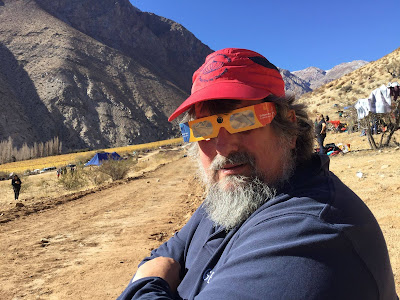I found a recent installment of the BBC radio program HARDtalk to be uncharacteristically uplifting. In a rebroadcast of a segment that originally aired in July 2020, Dr. Jane Goodall did discuss some hard truths, but she also offered listeners hope of a way forward in this most dismal year.
 |
| Dame Jane Goodall. Image: BBC |
I am sharing this interview with students in several of my courses because she explains the importance of connecting environmental protection with human rights and she describes exactly how that connection is made: by listening to the people most directly involved. She carries out this work with communities and individuals worldwide through two organizations -- the think tank/foundation Jane Goodall Institute and the youth movement Roots and Shoots.
More specifically, I am sharing this with students in my coffee classes because one of her many projects involves a cooperative of coffee farmers near the Gombe National Park, as the site of her original field work is now known. I first learned of the project when Gombe Reserve Coffee was being sold by Green Mountain Coffee. Jane Goodall continues to work with the Kanyovu Coffee Cooperative Society, a consortium of 12 coffee collectives representing 7,600 farmers near the park. Because sustainable coffee farming is a form of agroforestry, it can provide a critical buffer in areas adjacent to protected parks such as Gombe. Since the partnership with Green Mountain Coffee ended, I have not been able to find this coffee at a retail level, but the Goodall Institute and US-AID both continue to support the work of these growers.
 |
| Farmers protecting forests near Gombe Image: Jane Goodall Institute |
I was lucky enough to be in a room with Dr. Goodall just once, when she was kind enough to accept the first Atlas Award from the American Association of Geographers in 2010. This award is given by our national organization to a person who advances the values of geography but who does not identify primarily as a geographer. The HARDtalk interview reveals an interesting connection between geography and her work as an anthropologist: at a pivotal moment early in her studies in Gombe, National Geographic decided to report on her work. In the 2010 article Being Jane Goodall, the magazine reflects on the the first half century of her remarkable career. (This link is for NatGeo members only, but the article is available through most libraries.)
January 2022 Update: Amid much sad news at the new year -- including the death of E.O. Wilson -- a BBC interview with Jane Goodall was a bright spot. Her discussion with BBC's Climate Editor Justin Rowlatt is a thorough exploration of Lessons from the forest for climate change. It is a great example of the kind of geographic thinking we need at this crossroads in the life of our planet.
Lagniappe: Gorongosa
Thinking about Jane Goodall's embrace of local communities as an integral part of her environmental work reminds me of another example of a prominent scientist who partners with local experts. In my 2017 post Good News from Gorongosa, I introduce a wonderful documentary about the relationship between Tonga Torcida, a young man in a part of Mozambique that has been inhabited for 300,000 years and the imminent biologist E.O. Wilson.




